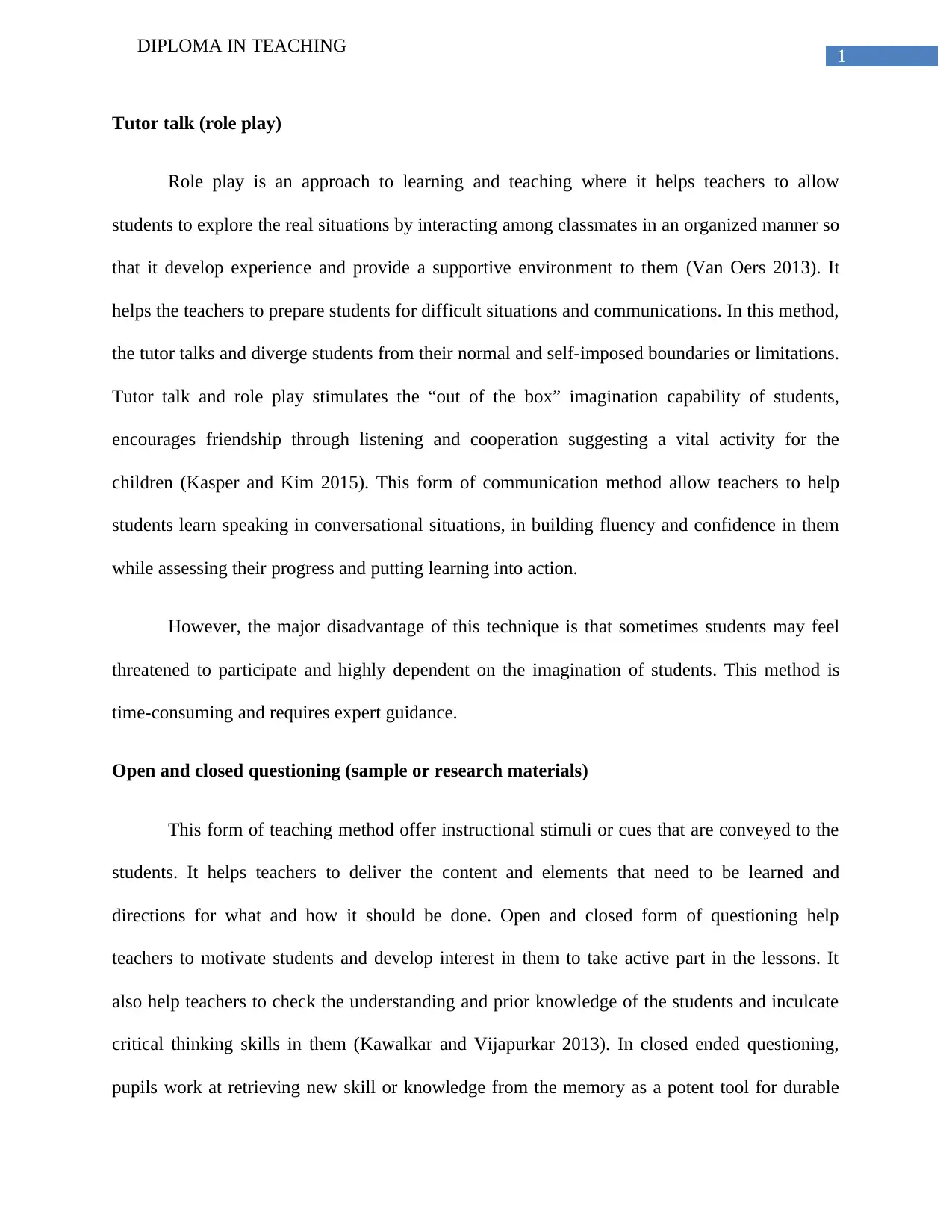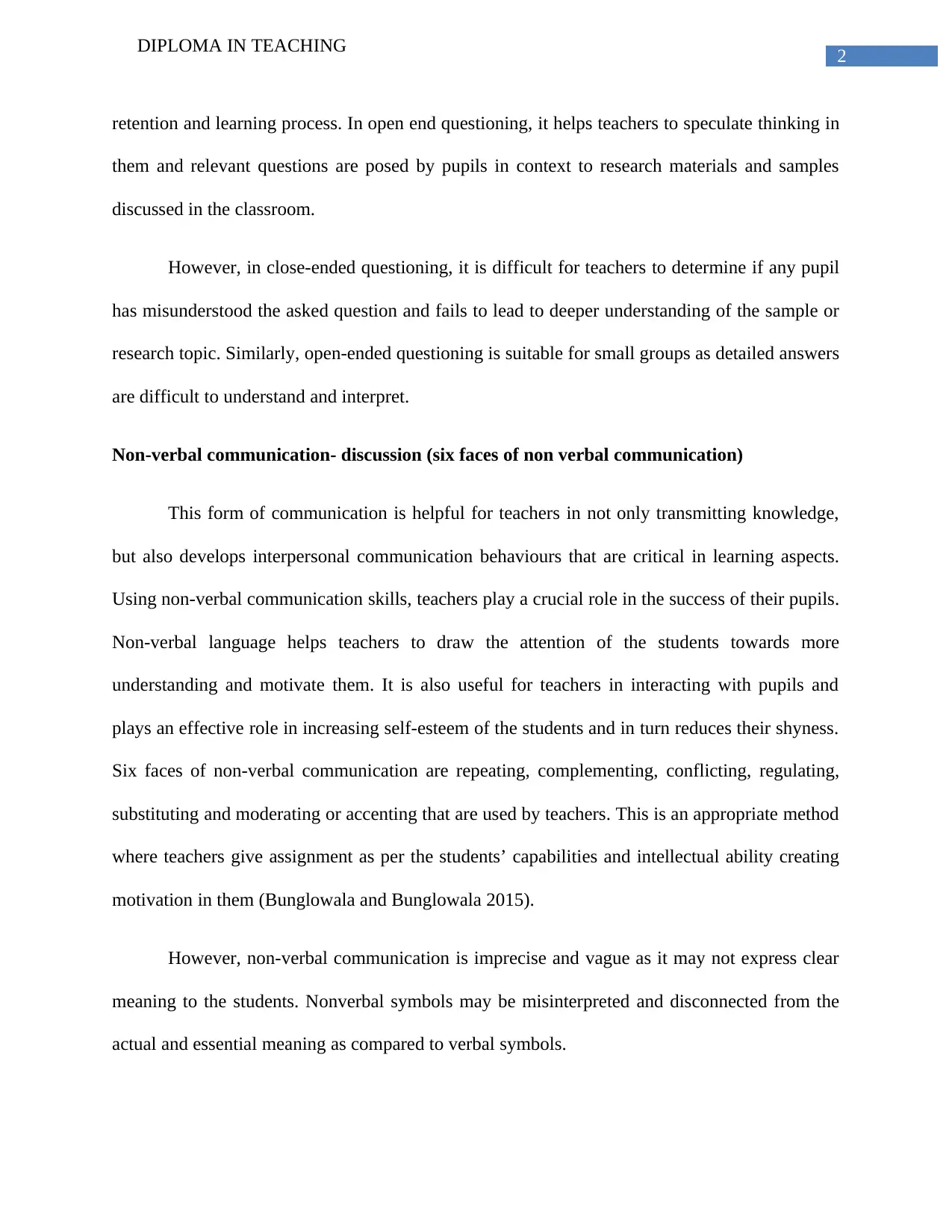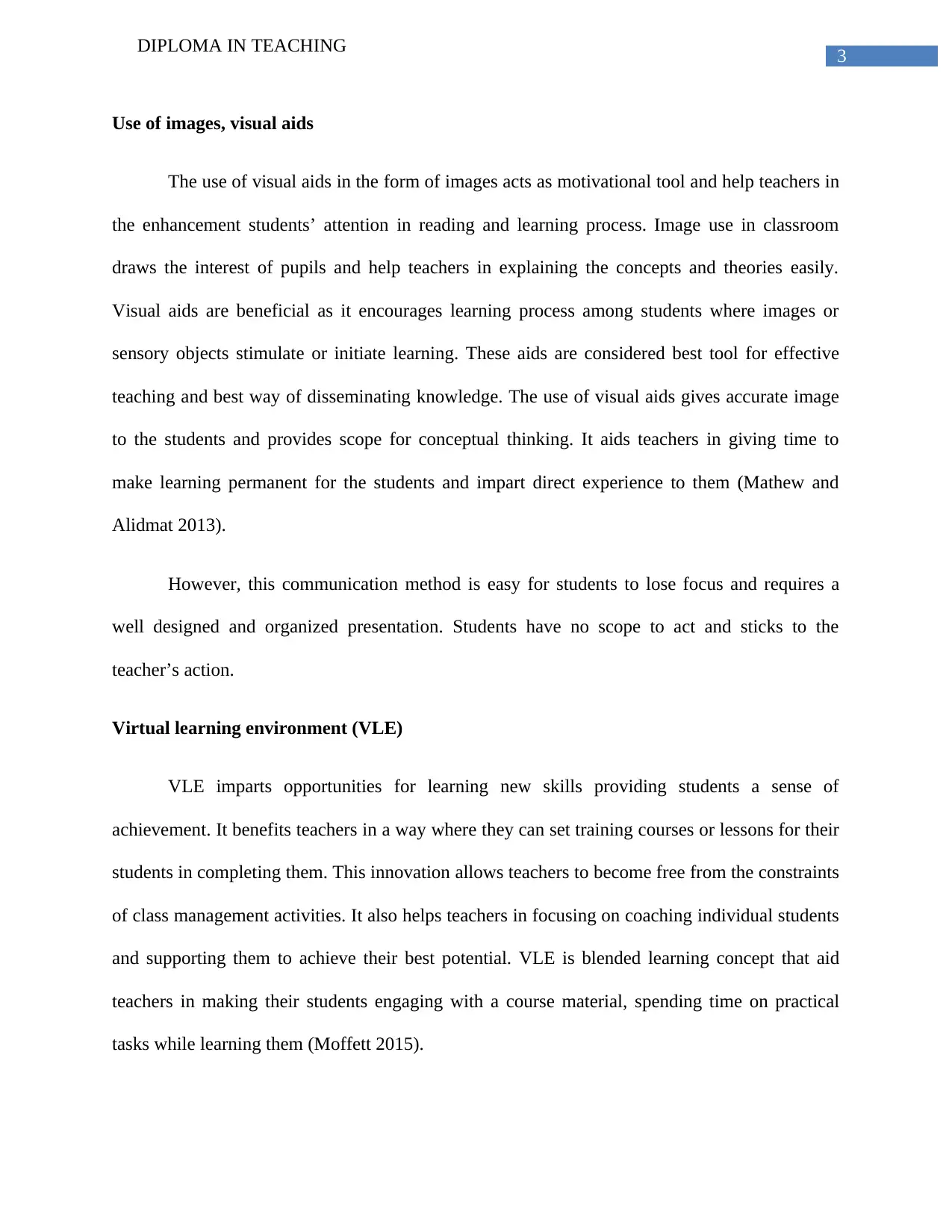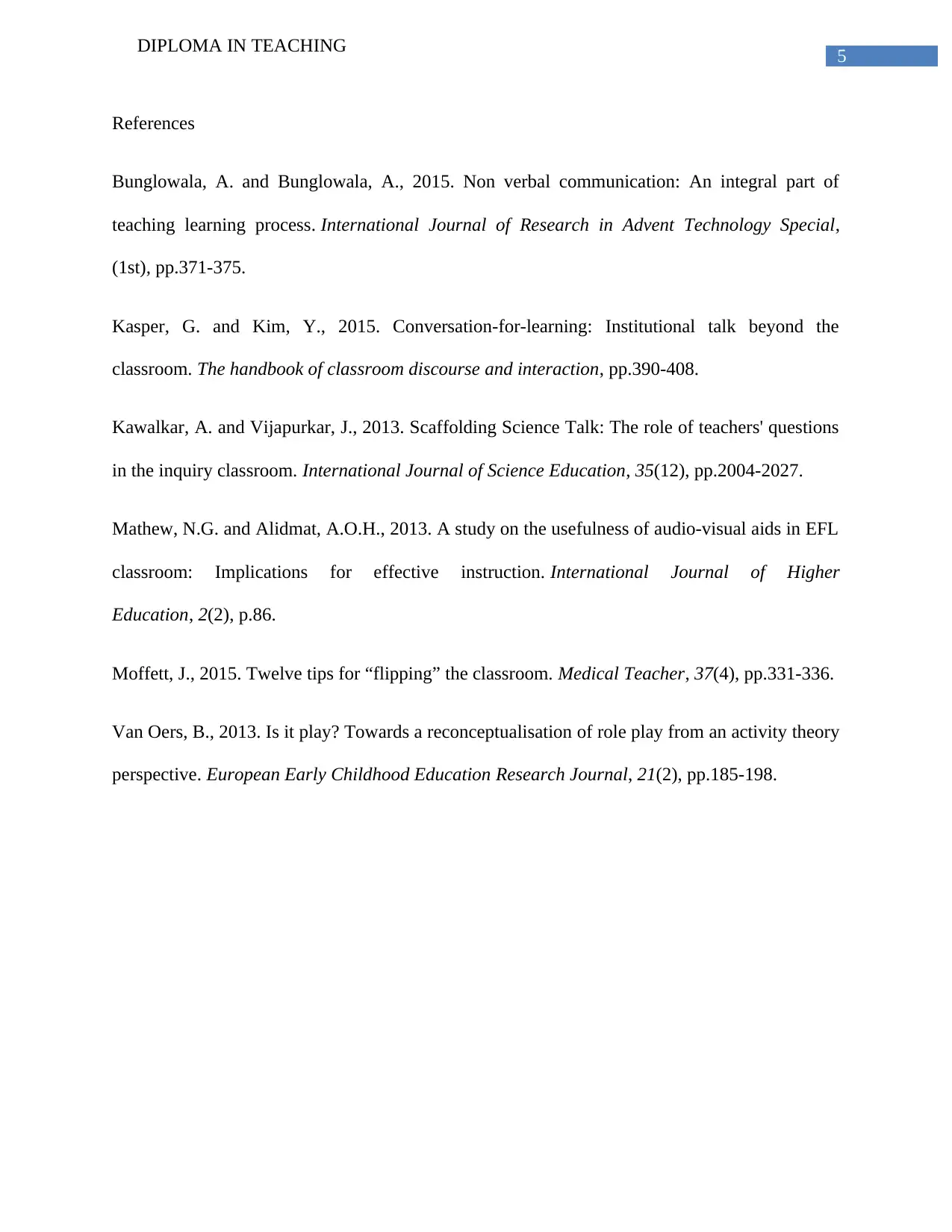Diploma in Teaching: An Analysis of Effective Teaching Methods Report
VerifiedAdded on 2023/06/08
|6
|1177
|216
Report
AI Summary
This report, prepared for a Diploma in Teaching program, delves into various effective teaching methods. It begins by examining role-playing, discussing its benefits in fostering student interaction and imagination while acknowledging its time-consuming nature. The report then analyzes open and closed questioning techniques, highlighting their roles in stimulating critical thinking and assessing understanding. Non-verbal communication is explored, emphasizing its importance in conveying information and building student engagement, along with the six faces of non-verbal communication. The use of images and visual aids is discussed as a means to enhance student attention and understanding. Finally, the report addresses virtual learning environments (VLE), showcasing their advantages in providing flexible learning opportunities, while also acknowledging potential limitations in terms of human interaction and multitasking. The report references relevant academic sources to support its analysis.

Running head: DIPLOMA IN TEACHING
Diploma in teaching
Name of the Student
Name of the University
Author note
Diploma in teaching
Name of the Student
Name of the University
Author note
Paraphrase This Document
Need a fresh take? Get an instant paraphrase of this document with our AI Paraphraser

1
DIPLOMA IN TEACHING
Tutor talk (role play)
Role play is an approach to learning and teaching where it helps teachers to allow
students to explore the real situations by interacting among classmates in an organized manner so
that it develop experience and provide a supportive environment to them (Van Oers 2013). It
helps the teachers to prepare students for difficult situations and communications. In this method,
the tutor talks and diverge students from their normal and self-imposed boundaries or limitations.
Tutor talk and role play stimulates the “out of the box” imagination capability of students,
encourages friendship through listening and cooperation suggesting a vital activity for the
children (Kasper and Kim 2015). This form of communication method allow teachers to help
students learn speaking in conversational situations, in building fluency and confidence in them
while assessing their progress and putting learning into action.
However, the major disadvantage of this technique is that sometimes students may feel
threatened to participate and highly dependent on the imagination of students. This method is
time-consuming and requires expert guidance.
Open and closed questioning (sample or research materials)
This form of teaching method offer instructional stimuli or cues that are conveyed to the
students. It helps teachers to deliver the content and elements that need to be learned and
directions for what and how it should be done. Open and closed form of questioning help
teachers to motivate students and develop interest in them to take active part in the lessons. It
also help teachers to check the understanding and prior knowledge of the students and inculcate
critical thinking skills in them (Kawalkar and Vijapurkar 2013). In closed ended questioning,
pupils work at retrieving new skill or knowledge from the memory as a potent tool for durable
DIPLOMA IN TEACHING
Tutor talk (role play)
Role play is an approach to learning and teaching where it helps teachers to allow
students to explore the real situations by interacting among classmates in an organized manner so
that it develop experience and provide a supportive environment to them (Van Oers 2013). It
helps the teachers to prepare students for difficult situations and communications. In this method,
the tutor talks and diverge students from their normal and self-imposed boundaries or limitations.
Tutor talk and role play stimulates the “out of the box” imagination capability of students,
encourages friendship through listening and cooperation suggesting a vital activity for the
children (Kasper and Kim 2015). This form of communication method allow teachers to help
students learn speaking in conversational situations, in building fluency and confidence in them
while assessing their progress and putting learning into action.
However, the major disadvantage of this technique is that sometimes students may feel
threatened to participate and highly dependent on the imagination of students. This method is
time-consuming and requires expert guidance.
Open and closed questioning (sample or research materials)
This form of teaching method offer instructional stimuli or cues that are conveyed to the
students. It helps teachers to deliver the content and elements that need to be learned and
directions for what and how it should be done. Open and closed form of questioning help
teachers to motivate students and develop interest in them to take active part in the lessons. It
also help teachers to check the understanding and prior knowledge of the students and inculcate
critical thinking skills in them (Kawalkar and Vijapurkar 2013). In closed ended questioning,
pupils work at retrieving new skill or knowledge from the memory as a potent tool for durable

2
DIPLOMA IN TEACHING
retention and learning process. In open end questioning, it helps teachers to speculate thinking in
them and relevant questions are posed by pupils in context to research materials and samples
discussed in the classroom.
However, in close-ended questioning, it is difficult for teachers to determine if any pupil
has misunderstood the asked question and fails to lead to deeper understanding of the sample or
research topic. Similarly, open-ended questioning is suitable for small groups as detailed answers
are difficult to understand and interpret.
Non-verbal communication- discussion (six faces of non verbal communication)
This form of communication is helpful for teachers in not only transmitting knowledge,
but also develops interpersonal communication behaviours that are critical in learning aspects.
Using non-verbal communication skills, teachers play a crucial role in the success of their pupils.
Non-verbal language helps teachers to draw the attention of the students towards more
understanding and motivate them. It is also useful for teachers in interacting with pupils and
plays an effective role in increasing self-esteem of the students and in turn reduces their shyness.
Six faces of non-verbal communication are repeating, complementing, conflicting, regulating,
substituting and moderating or accenting that are used by teachers. This is an appropriate method
where teachers give assignment as per the students’ capabilities and intellectual ability creating
motivation in them (Bunglowala and Bunglowala 2015).
However, non-verbal communication is imprecise and vague as it may not express clear
meaning to the students. Nonverbal symbols may be misinterpreted and disconnected from the
actual and essential meaning as compared to verbal symbols.
DIPLOMA IN TEACHING
retention and learning process. In open end questioning, it helps teachers to speculate thinking in
them and relevant questions are posed by pupils in context to research materials and samples
discussed in the classroom.
However, in close-ended questioning, it is difficult for teachers to determine if any pupil
has misunderstood the asked question and fails to lead to deeper understanding of the sample or
research topic. Similarly, open-ended questioning is suitable for small groups as detailed answers
are difficult to understand and interpret.
Non-verbal communication- discussion (six faces of non verbal communication)
This form of communication is helpful for teachers in not only transmitting knowledge,
but also develops interpersonal communication behaviours that are critical in learning aspects.
Using non-verbal communication skills, teachers play a crucial role in the success of their pupils.
Non-verbal language helps teachers to draw the attention of the students towards more
understanding and motivate them. It is also useful for teachers in interacting with pupils and
plays an effective role in increasing self-esteem of the students and in turn reduces their shyness.
Six faces of non-verbal communication are repeating, complementing, conflicting, regulating,
substituting and moderating or accenting that are used by teachers. This is an appropriate method
where teachers give assignment as per the students’ capabilities and intellectual ability creating
motivation in them (Bunglowala and Bunglowala 2015).
However, non-verbal communication is imprecise and vague as it may not express clear
meaning to the students. Nonverbal symbols may be misinterpreted and disconnected from the
actual and essential meaning as compared to verbal symbols.
⊘ This is a preview!⊘
Do you want full access?
Subscribe today to unlock all pages.

Trusted by 1+ million students worldwide

3
DIPLOMA IN TEACHING
Use of images, visual aids
The use of visual aids in the form of images acts as motivational tool and help teachers in
the enhancement students’ attention in reading and learning process. Image use in classroom
draws the interest of pupils and help teachers in explaining the concepts and theories easily.
Visual aids are beneficial as it encourages learning process among students where images or
sensory objects stimulate or initiate learning. These aids are considered best tool for effective
teaching and best way of disseminating knowledge. The use of visual aids gives accurate image
to the students and provides scope for conceptual thinking. It aids teachers in giving time to
make learning permanent for the students and impart direct experience to them (Mathew and
Alidmat 2013).
However, this communication method is easy for students to lose focus and requires a
well designed and organized presentation. Students have no scope to act and sticks to the
teacher’s action.
Virtual learning environment (VLE)
VLE imparts opportunities for learning new skills providing students a sense of
achievement. It benefits teachers in a way where they can set training courses or lessons for their
students in completing them. This innovation allows teachers to become free from the constraints
of class management activities. It also helps teachers in focusing on coaching individual students
and supporting them to achieve their best potential. VLE is blended learning concept that aid
teachers in making their students engaging with a course material, spending time on practical
tasks while learning them (Moffett 2015).
DIPLOMA IN TEACHING
Use of images, visual aids
The use of visual aids in the form of images acts as motivational tool and help teachers in
the enhancement students’ attention in reading and learning process. Image use in classroom
draws the interest of pupils and help teachers in explaining the concepts and theories easily.
Visual aids are beneficial as it encourages learning process among students where images or
sensory objects stimulate or initiate learning. These aids are considered best tool for effective
teaching and best way of disseminating knowledge. The use of visual aids gives accurate image
to the students and provides scope for conceptual thinking. It aids teachers in giving time to
make learning permanent for the students and impart direct experience to them (Mathew and
Alidmat 2013).
However, this communication method is easy for students to lose focus and requires a
well designed and organized presentation. Students have no scope to act and sticks to the
teacher’s action.
Virtual learning environment (VLE)
VLE imparts opportunities for learning new skills providing students a sense of
achievement. It benefits teachers in a way where they can set training courses or lessons for their
students in completing them. This innovation allows teachers to become free from the constraints
of class management activities. It also helps teachers in focusing on coaching individual students
and supporting them to achieve their best potential. VLE is blended learning concept that aid
teachers in making their students engaging with a course material, spending time on practical
tasks while learning them (Moffett 2015).
Paraphrase This Document
Need a fresh take? Get an instant paraphrase of this document with our AI Paraphraser

4
DIPLOMA IN TEACHING
However, some students may not be multi-tasking in handling programs on the computer
or skimming articles in the background while a video is running in the background trying to
complete more than one course at a time. It limits opportunities for human interaction, role-play,
discussion or brainstorming.
DIPLOMA IN TEACHING
However, some students may not be multi-tasking in handling programs on the computer
or skimming articles in the background while a video is running in the background trying to
complete more than one course at a time. It limits opportunities for human interaction, role-play,
discussion or brainstorming.

5
DIPLOMA IN TEACHING
References
Bunglowala, A. and Bunglowala, A., 2015. Non verbal communication: An integral part of
teaching learning process. International Journal of Research in Advent Technology Special,
(1st), pp.371-375.
Kasper, G. and Kim, Y., 2015. Conversation-for-learning: Institutional talk beyond the
classroom. The handbook of classroom discourse and interaction, pp.390-408.
Kawalkar, A. and Vijapurkar, J., 2013. Scaffolding Science Talk: The role of teachers' questions
in the inquiry classroom. International Journal of Science Education, 35(12), pp.2004-2027.
Mathew, N.G. and Alidmat, A.O.H., 2013. A study on the usefulness of audio-visual aids in EFL
classroom: Implications for effective instruction. International Journal of Higher
Education, 2(2), p.86.
Moffett, J., 2015. Twelve tips for “flipping” the classroom. Medical Teacher, 37(4), pp.331-336.
Van Oers, B., 2013. Is it play? Towards a reconceptualisation of role play from an activity theory
perspective. European Early Childhood Education Research Journal, 21(2), pp.185-198.
DIPLOMA IN TEACHING
References
Bunglowala, A. and Bunglowala, A., 2015. Non verbal communication: An integral part of
teaching learning process. International Journal of Research in Advent Technology Special,
(1st), pp.371-375.
Kasper, G. and Kim, Y., 2015. Conversation-for-learning: Institutional talk beyond the
classroom. The handbook of classroom discourse and interaction, pp.390-408.
Kawalkar, A. and Vijapurkar, J., 2013. Scaffolding Science Talk: The role of teachers' questions
in the inquiry classroom. International Journal of Science Education, 35(12), pp.2004-2027.
Mathew, N.G. and Alidmat, A.O.H., 2013. A study on the usefulness of audio-visual aids in EFL
classroom: Implications for effective instruction. International Journal of Higher
Education, 2(2), p.86.
Moffett, J., 2015. Twelve tips for “flipping” the classroom. Medical Teacher, 37(4), pp.331-336.
Van Oers, B., 2013. Is it play? Towards a reconceptualisation of role play from an activity theory
perspective. European Early Childhood Education Research Journal, 21(2), pp.185-198.
⊘ This is a preview!⊘
Do you want full access?
Subscribe today to unlock all pages.

Trusted by 1+ million students worldwide
1 out of 6
Related Documents
Your All-in-One AI-Powered Toolkit for Academic Success.
+13062052269
info@desklib.com
Available 24*7 on WhatsApp / Email
![[object Object]](/_next/static/media/star-bottom.7253800d.svg)
Unlock your academic potential
Copyright © 2020–2026 A2Z Services. All Rights Reserved. Developed and managed by ZUCOL.





